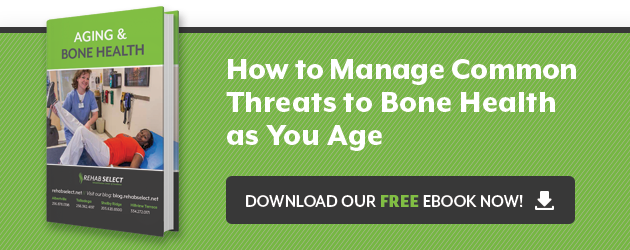 A good short term rehab program can be of great benefit to patients who have suffered osteoporosis-related injuries. Fractures are the most frequent injuries related to this extremely common disease, and often, they are the first inkling people have that they have been affected by osteoporosis. Fractures related to this bone-thinning disease occur most commonly in the wrist, spine or hip, and recovery can be challenging. Often, recovery is complicated by concerns about further injury, especially in newly diagnosed patients who may be fearful about their condition and patients with advanced bone loss. Rehabilitation therapy can help these patients overcome both the physical and emotional challenges of recovery.
A good short term rehab program can be of great benefit to patients who have suffered osteoporosis-related injuries. Fractures are the most frequent injuries related to this extremely common disease, and often, they are the first inkling people have that they have been affected by osteoporosis. Fractures related to this bone-thinning disease occur most commonly in the wrist, spine or hip, and recovery can be challenging. Often, recovery is complicated by concerns about further injury, especially in newly diagnosed patients who may be fearful about their condition and patients with advanced bone loss. Rehabilitation therapy can help these patients overcome both the physical and emotional challenges of recovery.
How Short Term Rehab Can Help After Osteoporosis Fractures
Patients who participate in a short term rehab program after an osteoporosis-related injury reap a number of short and long-term benefits from the comprehensive rehabilitation therapy these programs offer. Physical therapists can not only help patients regain strength and function following injury, but can also teach them about exercise and activities that will help them over the long run, working to maintain or improve bone health, decrease daily pain, and improve balance and posture. Physical therapists, along with occupational therapists and other rehabilitation specialists, also work to educate patients about safe movement and proper body mechanics, which yields both immediate and future benefits in terms of comfort, functional ability and injury prevention.
Occupational therapists can help patients learn to work around temporary disabilities caused by osteoporosis injuries or live to their fullest potential with permanent ones, promoting greater independence and quality of life. Nutritional counseling can help osteoporosis sufferers learn about bone-healthy diets, and rehabilitation physicians and nurses can provide effective medical and pain management during recovery and help educate patients on methods of managing pain and symptoms most efficiently over the long-term. Last, but certainly not least, social workers and counselors can help patients learn how to come to terms with and manage the emotional effects of living with osteoporosis.
What To Expect From Short Term Rehab For Osteoporosis-Related Injuries
Patients who enroll in a high-quality short term rehab program can expect to be treated by a physician-led, multidisciplinary team of rehabilitation specialists. Care and therapy will be comprehensive, intensive and tightly coordinated for maximum efficiency, furthering the primary goal of short term rehab: promoting quick, successful recoveries. Treatment plans are personalized to ensure that each patient's individual needs are met and are formulated based on a thorough evaluation done before or upon admission. Input from patients in formulating treatment plans and goals is not just welcomed, but expected. Then, those treatment plans are continually tracked, evaluated and, if necessary, adjusted throughout the treatment process to ensure that patients are making the best possible progress towards their rehabilitation goals.
Basically, short term rehab for osteoporosis-related injuries provides patients with the professional help and guidance, practical and emotional support, and targeted therapies and treatments they need to make their best recovery from those injuries and get back to living their lives. It also helps provide them with the knowledge, skills and equipment they need to manage their disease effectively, ensuring that they are well-positioned to live those lives to their fullest potential.





